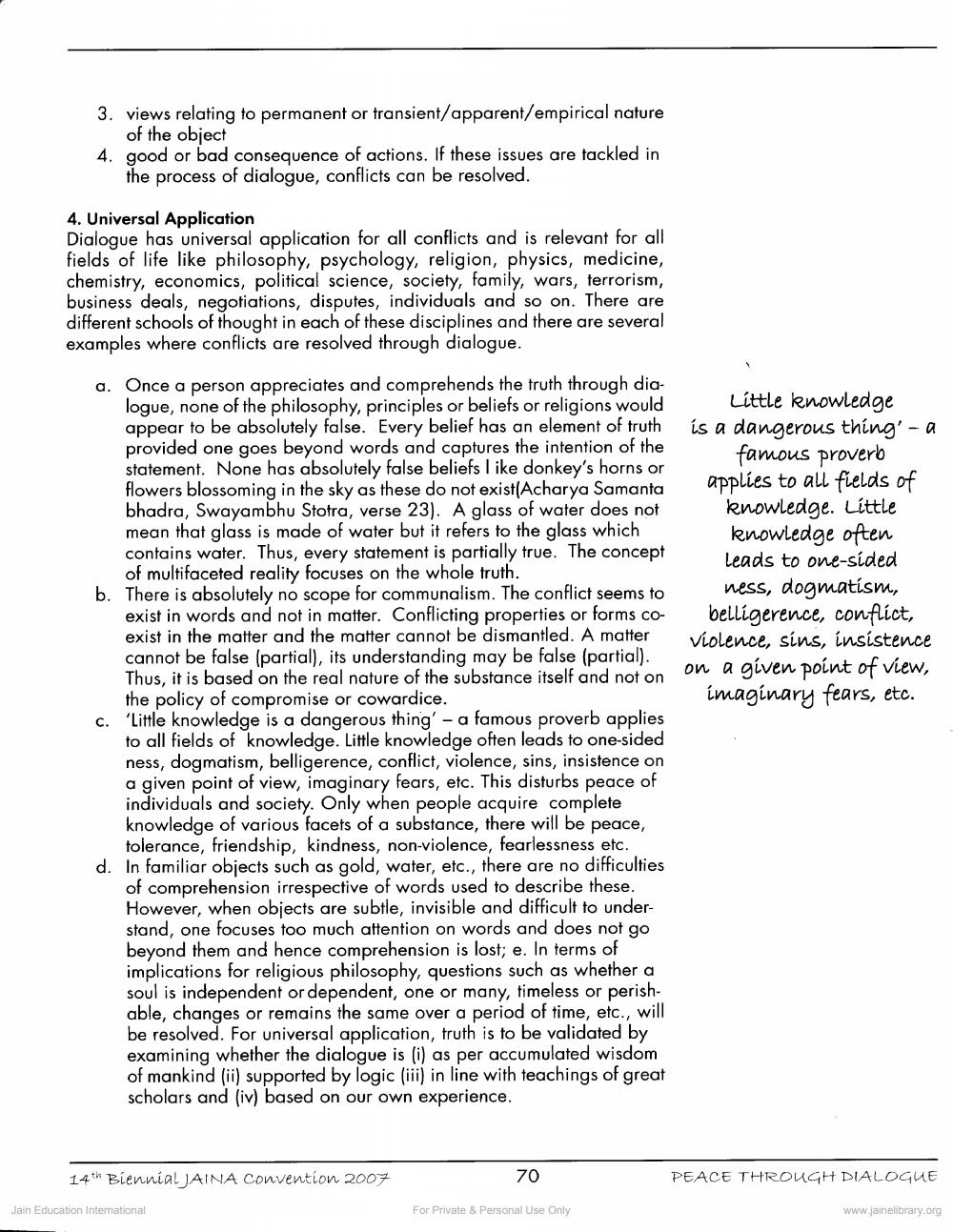________________
3. views relating to permanent or transient/apparent/empirical nature
of the object 4. good or bad consequence of actions. If these issues are tackled in
the process of dialogue, conflicts can be resolved.
4. Universal Application Dialogue has universal application for all conflicts and is relevant for all fields of life like philosophy, psychology, religion, physics, medicine, chemistry, economics, political science, society, family, wars, terrorism, business deals, negotiations, disputes, individuals and so on. There are different schools of thought in each of these disciplines and there are several examples where conflicts are resolved through dialogue.
a. Once a person appreciates and comprehends the truth through dialogue, none of the philosophy, principles or beliefs or religions would
Little lenowledge appear to be absolutely false. Every belief has an element of truth is a dangerous thing'-a provided one goes beyond words and captures the intention of the
famous proverb statement. None has absolutely false beliefs like donkey's horns or flowers blossoming in the sky as these do not exist(Acharya Samanta
applies to all fields of bhadra, Swayambhu Stotra, verse 23). A glass of water does not knowledge. Little mean that glass is made of water but it refers to the glass which
knowledge often contains water. Thus, every statement is partially true. The concept
Leads to one-sided of multifaceted reality focuses on the whole truth. b. There is absolutely no scope for communalism. The conflict seems to
ness, dogmatism, exist in words and not in matter. Conflicting properties or forms co- belligerence, conflict, exist in the matter and the matter cannot be dismantled. A matter
matter cannot be dismantled. A matter violence, sins, insistence cannot be false (partial), its understanding may be false (partial). Thus, it is based on the real nature of the substance itself and not on on a guven point OT VIEW,
on on a given point of view, the policy of compromise or cowardice.
imaginary fears, etc. c. 'Little knowledge is a dangerous thing' - a famous proverb applies
to all fields of knowledge. Little knowledge often leads to one-sided ness, dogmatism, belligerence, conflict, violence, sins, insistence on a given point of view, imaginary fears, etc. This disturbs peace of individuals and society. Only when people acquire complete knowledge of various facets of a substance, there will be peace,
tolerance, friendship, kindness, non-violence, fearlessness etc. d. In familiar objects such as gold, water, etc., there are no difficulties
of comprehension irrespective of words used to describe these. However, when objects are subtle, invisible and difficult to understand, one focuses too much attention on words and does not go beyond them and hence comprehension is lost; e. In terms of implications for religious philosophy, questions such as whether a soul is independent or dependent, one or many, timeless or perishable, changes or remains the same over a period of time, etc., will be resolved. For universal application, truth is to be validated by examining whether the dialogue is (i) as per accumulated wisdom of mankind (ii) supported by logic (iii) in line with teachings of great scholars and (iv) based on our own experience.
14th Biennial JAINA Convention 2007
70
PEACE THROUGH DIALOGUE
Jain Education Intemational
For Private & Personal Use Only
www.jainelibrary.org




